Deborah Swift's Blog, page 56
October 11, 2010
Doing research, and Macmillan New Writers blog
I'm busy researching my next work in progresss and I'm out and about in Museums and libraries looking at non-fiction books and 16th and 17th century objects. I'm lucky in that I live in a very historic village next to two old towns - Kendal and Lancaster, both of which have castles. Kendal castle is a very scenic ruin and Lancaster Castle featured in The Lady's Slipper as it is also (still) the town gaol.
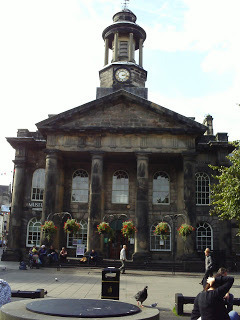
Last week I was in the museum at Lancaster, (see picture left) which tells the history of Lancaster, its Georgian heyday in the days of slave-trading and sugar, as well as its Roman artefacts.
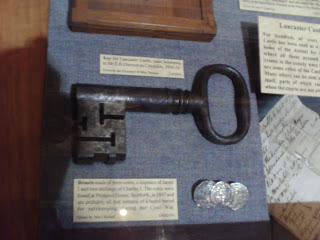 In Kendal this week I went on a guided walk of Quaker sites (It being Quaker week), past the old burial ground, the sites of the soup kitchen during the famine, and the typical Kendal octagonal summerhouses. Kendal was a town with many well-to-do men who were Quakers, so their influence is very evident in the town. Most were involved in the woollen industry or in banking - Quakers were renowned for their fairness in monetary transactions. Below is Sepulchre Lane, the route to the old Quaker Burial Ground.
In Kendal this week I went on a guided walk of Quaker sites (It being Quaker week), past the old burial ground, the sites of the soup kitchen during the famine, and the typical Kendal octagonal summerhouses. Kendal was a town with many well-to-do men who were Quakers, so their influence is very evident in the town. Most were involved in the woollen industry or in banking - Quakers were renowned for their fairness in monetary transactions. Below is Sepulchre Lane, the route to the old Quaker Burial Ground.
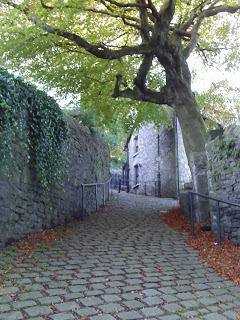 At the moment I am following my interest in the 17th century, but recently I have had a feeling I would like to go further back to the end of the Elizabethan era for my next book, so I am picking up books about the turn of the century and also collecting a store of visual images. I am investigating the period in Spain when England entered the thirty years war, and looking into the moorish influence on philosophy and religion in Spain, not to mention on architecture. Most of this I am doing through books and online, but I'm planning a visit to Spain soon!
At the moment I am following my interest in the 17th century, but recently I have had a feeling I would like to go further back to the end of the Elizabethan era for my next book, so I am picking up books about the turn of the century and also collecting a store of visual images. I am investigating the period in Spain when England entered the thirty years war, and looking into the moorish influence on philosophy and religion in Spain, not to mention on architecture. Most of this I am doing through books and online, but I'm planning a visit to Spain soon!
If you want to know why I write historical fiction and why I choose the periods I write in, you can find out this week on the Macmillan New Writers Blog.

Last week I was in the museum at Lancaster, (see picture left) which tells the history of Lancaster, its Georgian heyday in the days of slave-trading and sugar, as well as its Roman artefacts.
 In Kendal this week I went on a guided walk of Quaker sites (It being Quaker week), past the old burial ground, the sites of the soup kitchen during the famine, and the typical Kendal octagonal summerhouses. Kendal was a town with many well-to-do men who were Quakers, so their influence is very evident in the town. Most were involved in the woollen industry or in banking - Quakers were renowned for their fairness in monetary transactions. Below is Sepulchre Lane, the route to the old Quaker Burial Ground.
In Kendal this week I went on a guided walk of Quaker sites (It being Quaker week), past the old burial ground, the sites of the soup kitchen during the famine, and the typical Kendal octagonal summerhouses. Kendal was a town with many well-to-do men who were Quakers, so their influence is very evident in the town. Most were involved in the woollen industry or in banking - Quakers were renowned for their fairness in monetary transactions. Below is Sepulchre Lane, the route to the old Quaker Burial Ground. At the moment I am following my interest in the 17th century, but recently I have had a feeling I would like to go further back to the end of the Elizabethan era for my next book, so I am picking up books about the turn of the century and also collecting a store of visual images. I am investigating the period in Spain when England entered the thirty years war, and looking into the moorish influence on philosophy and religion in Spain, not to mention on architecture. Most of this I am doing through books and online, but I'm planning a visit to Spain soon!
At the moment I am following my interest in the 17th century, but recently I have had a feeling I would like to go further back to the end of the Elizabethan era for my next book, so I am picking up books about the turn of the century and also collecting a store of visual images. I am investigating the period in Spain when England entered the thirty years war, and looking into the moorish influence on philosophy and religion in Spain, not to mention on architecture. Most of this I am doing through books and online, but I'm planning a visit to Spain soon!If you want to know why I write historical fiction and why I choose the periods I write in, you can find out this week on the Macmillan New Writers Blog.
Published on October 11, 2010 06:58
September 30, 2010
Meditation and Writing
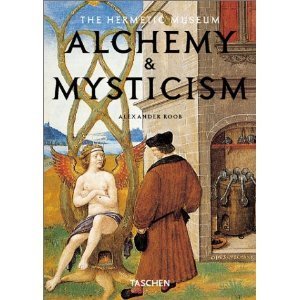 My second book is waiting for the editor's verdict and I am in the glorious research period of the next. Nothing is set in stone yet, so my mind can range free over a multitude of possibilities. It's a great excuse to curl up on the sofa with a pile of good non-fiction books, a cat (hopefully) purring on my lap and a cup of tea on the windowsill behind me.
My second book is waiting for the editor's verdict and I am in the glorious research period of the next. Nothing is set in stone yet, so my mind can range free over a multitude of possibilities. It's a great excuse to curl up on the sofa with a pile of good non-fiction books, a cat (hopefully) purring on my lap and a cup of tea on the windowsill behind me.During this phase I seem to do a lot of daydreaming and free-thinking, writing down ideas on a large spider diagram, looking for concepts or characters that seem to fit together. I use my intuition in this "fitting together."
Research I'm doing at the moment is based around Spain at the turn of the sixteenth century, as I am fairly sure some of the next book will be set there, but I also have books on Stuart Cookery, The Lives of the English Rakes and The Book of the Sword on the go, as well as a great Taschen picture book on Alchemy and Mysticism. And that is only the top of the pile. So how does all this input become output?
For me, one of the answers is meditation. I have been a meditator for more than 30 years. Those of you who are thinking I have this meditation-thing taped after all this time would be mistaken - it is still a discipline to sit, and to still the mind every day, and not to jump up going "I must get on with the writing/washing-up/filing/whatever else needs doing."
But the length of practice means I know from experience that it is the antidote to the chock-a-block mind, that it provides a creative space for the less obvious to appear. Whilst the thinking mind is working out things on the surface, the meditative mind perceives the undercurrents, the subtleties, maybe not even the things I can instantly put into words, but the sense of direction of the ideas I am working with, what I sometimes call the "true north" of where I am going and what I am doing.
Many other writers have a repetitive activity such as running or swimming that they use to quieten the mind. Others use the process of writing itself. There must be thousands of people writing the recommended "daily pages" of The Artist's Way, in order to put themselves in touch with deeper aspects of themselves. For most writers, writing itself uncovers the self, and because of this it can feel as if you are baring the soul.
I am lucky that I know a group of other women who meditate and once a month we get to each other's houses to sit in silence together and then have tea. We are of all different persuasions, christians, buddhists, quakers, atheists, not-quite-sure's, yet we find a value in this silent coming together. When we sit in silence it is as if we contact all the other silences - for silence is silence, is the same silence. This is one of the reasons I chose to write about the Quakers, as sitting in silence is their core activity.
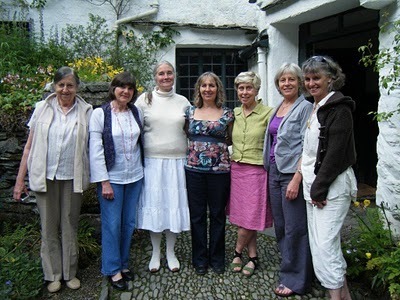
The picture shows some of the women's meditation group at the launch of The Lady's Slipper outside Townend. I'm the one in the middle!
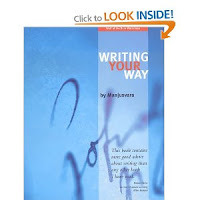 For those beginning writing and interested in meditation and the process of writing I can recommend "Writing Your Way" by Manjusvara and "Writing Down the Bones" by Natalie Goldberg. These books contain a wealth of ideas and exercises to get you started, and are a great resource for Creative Writing tutors.
For those beginning writing and interested in meditation and the process of writing I can recommend "Writing Your Way" by Manjusvara and "Writing Down the Bones" by Natalie Goldberg. These books contain a wealth of ideas and exercises to get you started, and are a great resource for Creative Writing tutors.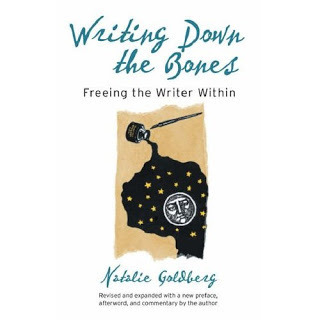
Published on September 30, 2010 08:15
September 23, 2010
"not a spark of literary talent"
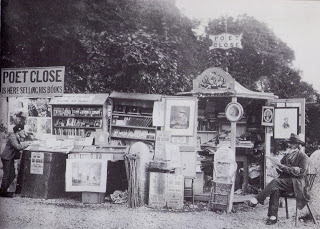 This was what they said about poor "Poet Close" who in desperation to be a published writer decided to set up his own stall on the shores of Lake Windermere by the steamer pier and sell his books and pamphlets to passers-by. Those who bought a book were rewarded with praise, and those who did not were richly abused! Shoud I not find a publisher for my latest novel, I am tempted to do as he did - get out my stall, print off a few copies, and add to it what seems to be the contents of my attic ...
This was what they said about poor "Poet Close" who in desperation to be a published writer decided to set up his own stall on the shores of Lake Windermere by the steamer pier and sell his books and pamphlets to passers-by. Those who bought a book were rewarded with praise, and those who did not were richly abused! Shoud I not find a publisher for my latest novel, I am tempted to do as he did - get out my stall, print off a few copies, and add to it what seems to be the contents of my attic ...
Published on September 23, 2010 09:41
September 13, 2010
Editing - Knowing when to stop
 My editing is done for now, and my new novel The Gilded Lily, companion volume to The Lady's Slipper, is with my agent. She has read it, loved it, and thinks it is ready to go off to the publishers. It has taken me over six months of editing, fiddling and re-writing to feel confident enough to send it to her, and even now there would be more work to do if I didn't decide to over-ride my over-active perfectionist and just stop somewhere.
My editing is done for now, and my new novel The Gilded Lily, companion volume to The Lady's Slipper, is with my agent. She has read it, loved it, and thinks it is ready to go off to the publishers. It has taken me over six months of editing, fiddling and re-writing to feel confident enough to send it to her, and even now there would be more work to do if I didn't decide to over-ride my over-active perfectionist and just stop somewhere. So how did I know it was ready? I suppose the changes I...
Published on September 13, 2010 06:08
September 4, 2010
Noms de Plumes, multiple personality disorder!
My post on how Martyn Baines became Tania Carver overnight can be found here. So far the author with the most names (seven) is.....(click link to find out!)
Published on September 04, 2010 08:17
September 1, 2010
The Art Of Storytelling
I've just come back from a weekend camping at the West Coutry Storytelling Festival in Devon. I managed to survive sleeping on a sloping airbed that was gradually making its way out of the tent, into the field full of cow pats and two bored-looking rams. I also got used to sitting for long hours on a camping mat whilst I listened to tales long and short, told by the acknowledged experts in their field (excuse the pun!).
Hearing stories told live is a great way to remind yourself of the power o...
Hearing stories told live is a great way to remind yourself of the power o...
Published on September 01, 2010 14:02
August 25, 2010
Will e-readers change our writing style?
"I recently had an editor ask me to cut down my paragraphs into four, maybe five sentences. To find a break point in ones that were longer and limit the number of sentences. The reason – they play better on an e-reader. The size of the screens is conducive to shorter paragraphs rather than longer ones. So instead of describing a room in terms of sight, sound and smells, I needed a separate paragraph for each. It made sense in that context but it made for a change in my writing style."
This wa...
This wa...
Published on August 25, 2010 05:38
August 22, 2010
Mary Beale - 17th Century artist
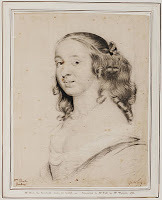 On Hoydens and Firebrands you can find my post about the first woman artist to make her living from painting. A fascinating independent spirit, her paintings hang in the National Gallery.
On Hoydens and Firebrands you can find my post about the first woman artist to make her living from painting. A fascinating independent spirit, her paintings hang in the National Gallery.
Published on August 22, 2010 14:04
August 20, 2010
"His Last Duchess" by Gabrielle Kimm - Review
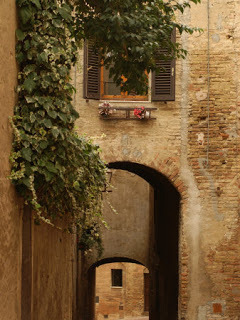 This is the sort of book to take away with you on a wet weekend as it immediately conjures a sense of the hot sun of Renaissance Italy.
This is the sort of book to take away with you on a wet weekend as it immediately conjures a sense of the hot sun of Renaissance Italy. One of Gabrielle Kimm's strengths is that she is able to convey that heat and light to someone like me, sitting in Cumbria with the grey rain sheeting down outside. Her other strength is in describing the minutiae of life in a Tuscan estate, including a wonderful description of the kitchens, the intricacies of falconry, the manufacture of lime, and most of...
Published on August 20, 2010 02:24
August 8, 2010
Why do writers reach for the past?
There is a great article on the guardian blog about historical fiction and historical accuracy, for example whether accurate equals good.
http://www.guardian.co.uk/books/booksblog/2010/aug/06/lying-historical-fiction
It also says that much of today's fiction is actually historical fiction in that it is set before the writer's lifetime. Most fiction that attracts me is set either in the past, in a foreign country, or in an alternative past.
So what is it that makes so many writers reach for the p...
http://www.guardian.co.uk/books/booksblog/2010/aug/06/lying-historical-fiction
It also says that much of today's fiction is actually historical fiction in that it is set before the writer's lifetime. Most fiction that attracts me is set either in the past, in a foreign country, or in an alternative past.
So what is it that makes so many writers reach for the p...
Published on August 08, 2010 07:25



